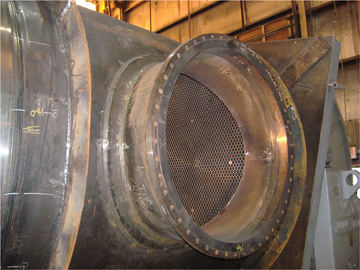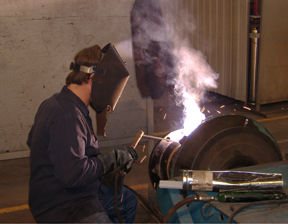Stick Electrode Helps Oklahoma Company Simplify Inventory, Welding Processes
Imagine a company that operates every type of welding process in its shops—from TIG and MIG to flux-cored, stick and sub-merged arc—and think about how much equipment this company would have to maintain, not to mention the welding consumables inventory its employees would need to use and manage. Now consider that this company’s welding shop is home to 60 welding operators who are responsible for critical welds on pressure vessels of varying materials and thicknesses, all of which are destined for some of the most well-known oil refineries in the country. At this point, you’ll start to get an idea of the challenges facing a company such as Cust-O-Fab, Inc.
To ensure its customers keep their own operations on track, Cust-O-Fab has to keep on a tighter fabrication and repair schedule than do most companies, doing whatever it can to minimize downtime internally. That includes eliminating weld rework, streamlining workflow, and simplifying inventory of multiple welding consumables.
In recent years, with the help of their local welding supply distributor, Lloyd Hyle of Alloy Welding Supply, Inc., and Hobart Brothers Company, Cust-O-Fab tackled this last issue head on, rectifying a long-standing problem: how to prevent confusion between two AWS 7018 stick electrodes, one for low temperature, stress relieved applications and the other non-stress relieved jobs. The solution—a dual certified, specially formulated stick electrode for stress relieved applications and normal E7018 applications, called Hobart® 718 TSR. Hobart 718TSR stick electrode allows Cust-O-Fab’s welding operators to weld on parts that will be heat treated and those that
will not, both with the same high quality results.
A Company on the Go
Cust-O-Fab operates on two simple, yet valuable principles that keep its oil refinery and petrochemical customers returning time and time again: maintain the absolute shortest backlog possible and provide the highest quality results every time. In fact, Cust-O-Fab team prides itself on accurately completing most of its repair and fabrication jobs in as little as 24 hours. They manage this expedited feat from the company’s headquarters in Sand Springs, Okla., a small town near Tulsa, where highly-trained certified welding operators take on the most critical of projects—welding shell and tube heat exchangers, pressure vessels and air-cooled coil sections, among others—to strict ASME (American Society of Mechanical Engineers) codes [ASME Section 8, Division 1; ASME Section 1]. Not only that, but all of the work requested of Cust-O-Fab requires compliance to the customers’ individual specifications for their particular application, and every weld must be inspected and hydro- or air-tested for quality assurance.
All of Cust-O-Fab’s welding operators hold multiple welding certifications that allow them to tackle each of these jobs, regardless of the material (common types include carbon steel, stainless steel, and more heavily alloyed metals) or the welding process. Keeping Track of It AllWith such demanding customer standards, unique welding requirements and the strict timelines included, there is no room for error on any job that Cust-O-Fab accepts.
Tony Phillips, Vice President explains, “Our fabrication and repair jobs change weekly. Because of that, our welding operators may run one welding product today and run another one tomorrow.”
Over the years, keeping track of those welding products has been a challenge for the company, especially preventing confusion between the two types of stick electrodes that its welding operators use. Typical projects such as welding nozzles to pressure vessels or welding plates and corner joints often require an E7018 stick electrode for standard welds, while other applications require a higher impact strength stick electrode for parts that need to be stress-relieved.
Stress relieving is a type of post-weld heat treatment (PWHT) that helps improve the mechanical properties of a weld,

Cust-O-Fab repairs and fabricates for some of the
country’s largest oil refineries.
and is a common requirement for critical applications like pressure vessel welding. The process requires uniformly heating the fabricated part to a high temperature (often over 1000 degrees Fahrenheit) then slowly and evenly cooling it. The resulting weld offers greater impact strengths (the ability to resist shock), especially at low temperatures. That’s essential considering some of Cust-O-Fab’s applications can require welds that remain ductile to temperatures as low as -50 degrees Fahrenheit. Still, keeping tabs on the two types of AWS E7018 stick electrodes has been tough over the years given the company’s fast-paced environment.
“We’ve always had to keep two stick electrodes on the shelf or in the ovens, one for ‘normal’ welding jobs and one for the heat treated [stress-relieved] jobs. Supervisors had to check constantly that the right rod was being used,” says Paul Stokes, Plant Supervisor. “There was always the opportunity to have problems. Fortunately we never did, but still we just had to keep our eyes open constantly to prevent mix-ups.”
Of course given the company’s dedication to keeping a short backlog of its projects, mistakes have never been an option. Rework associated with grinding out a weld made with a standard AWS 7018 electrode not capable of meeting stress relieved properties on a part requiring the necessary stress-relieved properties could become costly, time-consuming and just plain frustrating for everyone involved.
Pat Thomas, the company’s Manager of Quality Control, adds “To prevent confusion among our welders, we really wanted to get one product that would work for both applications. Also, we didn’t want to stock two items—we needed a universal rod to meet all our 7018 welding requirements.”
To help address this request, Cust-O-Fab’s longtime welding supply distributor, Lloyd Hyle, stepped in to the picture, along with the welding engineers at Hobart Brothers. Hyle himself was involved with the fabricating of pressure vessels in another company for 15 years before joining the Sapulpa, Okla. distributorship, Alloy Welding Supply, Inc. He has seen first-hand the potential for confusion that having two very similar stick electrodes could create—not just for welding operators, but also for those in charge of inventory management.
“I’ve also always thought it would be great if we just had one electrode that would cover everything—welds needing high impact strengths or those without,” Hyle explains. “A dual-certified product.”
To make everyone’s request a reality, Hyle and Cust-O-Fab turned to Hobart Brothers to create the new Hobart 718TSR stick electrode.
More Than Just a Name
Formulating a new filler metal, whether it’s a stick electrode or tubular wire, is never an easy or quick task, but it’s a undertaking from which Hobart Brothers has never shied away. According to Hyle, the request for a product formulated and designed specifically for pressure vessel welding applications like Cust-O-Fab’s was well received and Hobart Brothers successfully formulated one AWS 7018 product for Cust-O-Fab to use for welding both standard (also called as-welded) and stress-relieved applications.
The Hobart 718TSR stick electrode is first and foremost formulated for stress-relieved applications. The product, according to Hyle, gained its name from the fact that Cust-O-Fab, and other heat exchanger fabricators, are so prolific in the Tulsa area. Hence, 718TSR or Tulsa Stress Relieved.
In addition to creating a product that is dual-certified, engineers at Hobart Brothers provided the Hobart 718TSR stick electrode with other features they knew were critical to pressure vessel welding. Because the welds in these applications must be tested to ensure their strength and integrity, engineers made certain that the Hobart 718TSR stick electrode was capable, when used properly, of providing X-ray quality welds. Cust-O-Fab’s welding operators achieve those welds through their own welding skill, too, of course, but also through the product’s ability to provide consistent arc starts and re-starts without porosity. Additionally, the Hobart 718TSR has low spatter levels and easy-to-remove slag, and creates a smooth, flat bead shape, so Cust-O-Fab’s welding operators have less clean-up or rework—again, factors that help them keep them on the company’s tight timelines.
According to Phillips, the Hobart 718TSR stick electrode accounts for the most extreme of stress-relieved applications Cust-O-Fab could possibly encounter, and it also gives the company the high quality welds they need. It is certified to retain its weld properties in a service environment as cold as -50 degrees Fahrenheit after 16 hours stress relieving at 1150 degrees Fahrenheit. Those weld properties equal a tensile strength of 76,000 psi after heat-treating, or stress relieving, and a 86,000 psi as-welded tensile strength for the company’s other applications. Plus, Cust-O-Fab now has eliminated any confusion about its E7018 products and also has lowered its stocking and inventory costs, even though it still has to purchase and track several diameters of the Hobart 718TSR (from 1/8 to 7/32 inch). “Because Hobart developed this new product, we can use the same welding product on all our parts that need a 7018 weld,” says Thomas. “It has definitely reduced our stocking level. Sure, we’re buying the same poundage, but we’re saving time keeping up with that stock now.”
Stokes adds, “It has really simplified our weld procedures, too, and it saves us time in production because of that.”
The Final Verdict
Saving time, confusion and keeping on schedule with the Hobart 718TSR stick electrode, according to everyone at Cust-O-Fab, adds to the company’s tried and true formula for success. And it’s the best way to keep them operating on the ‘keep the shortest backlog possible’ principle, while still achieving the best quality.
Plus, says Thomas, the development of the Hobart 718TSR “says something about customer relationships…about Lloyd and Hobart Brothers listening to us and working with us to create the product we want.”
Hyle adds that for a company like Cust-O-Fab, this stick electrode just makes sense to keep the business on the right course. “These guys are different than most people. They’ll take a unit [pressure vessel] on Friday and give it back to you on Monday. They just work fast.”
Fortunately for Cust-O-Fab’s welding operators, so does their new stick electrode.



